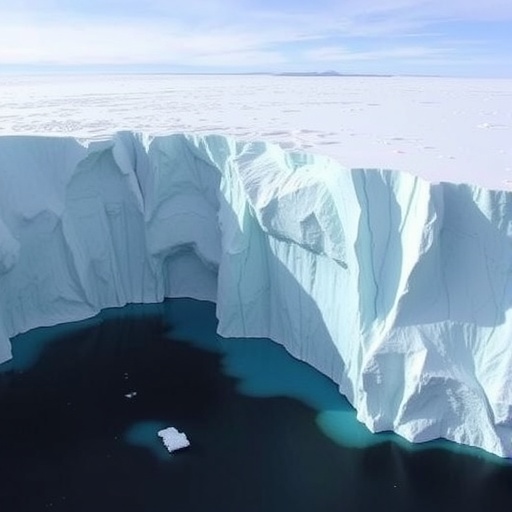New Insights into Antarctic Ice Shelf Collapse Reveal Crucial Meltwater Feedback Mechanisms
Antarctica’s ice shelves serve as vital barometers of climate change, their stability intricately tied to global sea levels and ocean dynamics. A groundbreaking study by Suganuma, Itaki, Haneda, and colleagues, recently published in Nature Geoscience, sheds new light on the Holocene epoch’s ice-shelf collapses along East Antarctica’s Lützow-Holm Bay (LHB) region. This research reveals the profound influence of meltwater release on driving feedback loops that accelerate the inflow of warmer Circumpolar Deep Water (CDW), ultimately leading to rapid ice-shelf disintegration and extensive ice-sheet thinning.
The intricate relationship between melting ice, ocean currents, and atmospheric shifts has long intrigued scientists. Previous hypotheses emphasized the role of the Southern Hemisphere Westerly Winds (SHWW) shifting southwards as a primary mechanism fostering enhanced CDW incursions beneath Antarctic ice shelves. However, this new study emphasizes that meltwater itself is not merely a passive product of warming, but an active facilitator that intensifies these oceanic processes, forging a self-reinforcing cycle of ice loss.
Detailed sediment core analyses from LHB unveiled signatures of past ice-shelf collapse events co-occurring with elevated meltwater discharges into the Southern Ocean. These meltwater pulses promote freshening near the ice margins, modifying local ocean stratification and circulation patterns. As stratification strengthens, it paradoxically allows warmer CDW to penetrate closer to the grounding lines of glaciers, destabilizing ice shelves from below. This process orchestrates a positive feedback loop, where initial melting begets conditions favoring further warm water intrusion and accelerated ice retreat.
Understanding these feedbacks is critical, as the meltwater-driven amplification of CDW upwelling can function as a tipping mechanism with far-reaching implications beyond localized melt zones. The study highlights how retreat initiated in a seemingly isolated sector like LHB may trigger cascading effects that propagate along the Antarctic margin through complex interactions involving the Antarctic Circumpolar Current (ACC), subpolar gyres, and the Antarctic Coastal Current.
These oceanic circulations act as conveyor belts, disseminating altered water masses and temperature anomalies across vast distances. Such dynamical connectivity underscores the vulnerability of the Antarctic ice sheet to regional disturbances and challenges the notion of stable, isolated glacial compartments. Instead, it reveals an interconnected system where changes can cascade rapidly, exacerbating losses in remote sectors through teleconnected ocean-atmosphere processes.
The researchers assert that this cascading behavior exemplifies a previously underappreciated positive feedback loop integral to ice-sheet retreat dynamics. It underscores the urgent need to incorporate coupled ocean-ice interactions into predictive models. Current ice-sheet models often lack detailed oceanic coupling, limiting their fidelity in forecasting future ice behavior and resultant global sea-level rise with sufficient precision.
Furthermore, this feedback process exhibits both local and large-scale components, emphasizing the necessity for a multidisciplinary approach in Antarctic research. Combining paleoceanography, sedimentology, oceanography, and glaciology enables a holistic understanding of the past and future state of Antarctic ice shelves under climatic perturbations.
These findings also provide a sobering perspective on contemporary climate trajectories. The Holocene, a period marked by relatively stable climate conditions following the last glacial period, already witnessed dramatic ice-shelf collapses driven by subtle shifts in ocean and atmospheric dynamics. Anthropogenic warming today, with its unprecedented pace and magnitude, may perpetuate or even amplify these feedback loops, threatening accelerated sea-level rise over coming decades.
In translating these insights into actionable science, the study advocates for an expansion of observational infrastructure around Antarctica. Enhanced monitoring of ocean temperature profiles, salinity gradients, and meltwater fluxes along ice margins will augment our capability to detect early warning signals of destabilization. Satellite remote sensing combined with in situ measurements will be essential to track real-time interactions between ocean currents and melting ice.
Moreover, incorporating these feedback mechanisms into global climate models will improve projections of sea-level rise and inform coastal adaptation strategies worldwide. Recognizing the Antarctic ice sheet as a dynamically coupled system rather than an isolated entity enables policymakers and scientists to better anticipate potential thresholds and nonlinear responses.
This pioneering research also opens avenues for investigating similar processes in other polar and glaciated systems globally. Understanding feedbacks involving meltwater and ocean dynamics could shed light on historic abrupt climate events and guide future risk assessments.
Ultimately, this study exemplifies the power of integrative Earth system science to unravel complex climate interactions. By tracing the role of meltwater as both a consequence and driver of oceanic heat flux modifications, the authors illuminate pathways through which Antarctica’s ice shelves have responded to past climate variability, with direct implications for forecasting future change.
The continuous interplay of winds, currents, and melting ice not only shapes the fate of Antarctic ice shelves but also influences global ocean circulation patterns, carbon cycles, and climate feedbacks. The revelations presented by Suganuma and colleagues highlight how small perturbations can cascade into substantial alterations in cryosphere stability, thereby demanding vigilance and innovation in climate research.
As melting accelerates and feedback loops strengthen, humanity faces an evolving and uncertain future linked inexorably to the vast and dynamic Antarctic continent. This study strengthens the case that to understand and mitigate forthcoming changes, models must evolve beyond static representations, embracing the intricate dance of oceanic and cryospheric processes driving Antarctica’s ongoing transformation.
Subject of Research: Antarctic ice-sheet and ice-shelf dynamics, oceanic feedback mechanisms.
Article Title: Antarctic ice-shelf collapse in Holocene driven by meltwater release feedbacks.
Article References:
Suganuma, Y., Itaki, T., Haneda, Y. et al. Antarctic ice-shelf collapse in Holocene driven by meltwater release feedbacks. Nat. Geosci. (2025). https://doi.org/10.1038/s41561-025-01829-7




